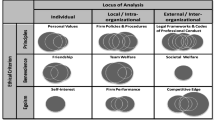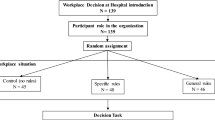Abstract
This paper is aimed at investigating the differences in ethical perception between Mainland China and Hong Kong through qualitative analysis. The level of idealism and relativism of the informants are measured quantitatively. The qualitative analysis of the viewpoints of participants from Hong Kong and other Chinese cities offers a profound understanding of ethical perception. Contradicting previous studies, our research offers a fresh perspective, indicating that those with high idealism are not always the ones who condemn misconduct or advocate for whistle-blowing. Interestingly, we noted that individuals with high relativism frequently consider and emphasize alternative perspectives, rather than merely condemning or advocating misconduct and whistle-blowing. Conversely, those with low relativism frequently exhibit more anger, regardless of their stance. This discovery suggests that high relativism could be beneficial for facilitating communication between conflicting parties.
Similar content being viewed by others
References
Al-Khatib, J. A., Al-Habib, M. I., Bogari, N., & Salamah, N. (2016). The ethical profile of global marketing negotiators. Business Ethics: A European Review, 25(2), 172–186.
Al-Khatib, J. A., Vollmers, S. M., & Liu, Y. (2007). Business-to-business negotiating in China: The role of morality. Journal of Business & Industrial Marketing, 22(2), 84–96.
Arli, D., & Pekerti, A. (2017). Who is more ethical? Cross-cultural comparison of consumer ethics between religious and non-religious consumers. Journal of Consumer Behaviour, 16(1), 82–98.
Barnett, T., Bass, K., & Brown, G. (1994). Ethical ideology and ethical judgment regarding ethical issues in business. Journal of Business Ethics, 13, 469–480.
Braun, V., & Clarke, V. (2006). Using thematic analysis in psychology. Qualitative Research in Psychology, 3(2), 77–101.
Bruhn, M., Schoenmuller, V., Schafer, D., & Heinrich, D. (2012). Brand authenticity: Towards a deeper understanding of its conceptualization and measurement. Advances in Consumer Research, 40, 567–576.
Cialdini, R., & Tost, M. (1998). Social influence: Social norms, conformity, and compliance. In D. Gilbert, S. Fiske, & G. Lindzey (Eds.) The handbook of social psychology (4th ed.). New York: Oxford University Press
Chan, R. Y. K., & Lai, J. W. M. (2011). Does ethical ideology affect software piracy attitude and behavior? An empirical investigation of computer users in China. European Journal of Information Systems, 20, 659–673.
Chan, H. F. S., Tang, F., & Yeung, K. Y. K. (2023). Courtesy or integrity: What constitutes a stakeholder-caring image? Asian Journal of Business Ethics, 12(2), 257–284.
Chan, A., Wong, S., & Leung, P. (1998). Ethical beliefs of Chinese consumers in Hong Kong. Journal of Business Ethics, 17(11), 1163–1170.
Chaudhry, P. E., & Stumpf, S. A. (2011). Consumer complicity with counterfeit products. Journal of Consumer Marketing, 28(2), 139–151.
Chiu, R. K., & Erdener, C. B. (2003). The ethics of peer reporting in Chinese societies: Evidence from Hong Kong and Shanghai. The International Journal of Human Resource Management, 14(2), 335–353.
Davis, M. A., Johnson, N. B., & Ohmer, D. G. (1998). Issue contingent effects on ethical decision making: A cross-cultural comparison. Journal of Business Ethics, 17, 373–389.
Demuijnck, G. (2015). Universal values and virtues in management versus cross-cultural moral relativism: An educational strategy to clear the ground for business ethics. Journal of Business Ethics, 128(4), 817–835.
Dhamija, S., & Rai, S. (2018). Role of retaliation and value orientation in whistleblowing intentions. Asian Journal of Business Ethics, 7(1), 37–52.
Dion, M. (2010). Corruption and ethical relativism: What is at stake? Journal of Financial Crime, 17(2), 240–250.
Douglas, P. C., & Wier, B. (2005). Cultural and ethical effects in budgeting systems: A comparison of U.S. and Chinese managers. Journal of Business Ethics, 61, 159–174.
Forsyth, D. R. (1980). A taxonomy of ethical ideologies. Journal of Personality and Social Psychology, 39, 175–184.
Forsyth, D. R. (1992). Judging the morality of business practices: The influence of personal moral philosophies. Journal of Business Ethics, 11(5–6), 461–470.
Forsyth, D. R., & Berger, R. E. (1982). The effects of ethical ideology on moral behaviour. The Journal of Social Psychology, 117, 53–56.
Forsyth, D. R., & Nye, J. L. (1990). Personal moral philosophies and moral choice. Journal of Research in Personality, 24, 3985–4414.
Forsyth, D. R., O’Boyle, E. H., Jr., & McDaniel, M. A. (2008). East meets West: A meta-analytic investigation of cultural variations in idealism and relativism. Journal of Business Ethics, 83, 813–833.
Forsyth, D. R., O’Boyle, E. H., Jr., & McDaniel, M. A. (2011). Rules, standards and ethics: Relativism predicts cross-national differences in the codification of moral standards. International Business Review, 20(3), 353–361.
Fragale, A. R., Rosen, B., Xu, C., & Merideth, I. (2009). The higher they are, the harder they fall: The effects of wrongdoer status on observer punishment recommendations and intentionality attributions. Organizational Behavior and Human Decision Processes, 108(1), 53–65.
Glover, S. H., Bumpus, M. A., Logan, J. E., & Ciesla, J. R. (1997). Re-examining the influence of individual values on ethical decision making. Journal of Business Ethics, 16, 1319–1329.
Ha, S., & Lennon, S. J. (2006). Purchase intent for fashion counterfeit products: Ethical ideologies, ethical judgments, and perceived risks. Clothing and Textiles Research Journal, 24(4), 297–315.
Jackson, T., David, C., Deshpande, S., Jones, J., Joseph, J., Lau, K. F., Matsuno, K., Nakano, C., Park, H.-J., Piorunowska-Kokoszko, J., Taka, I., & Yoshihara, H. (2000). Making ethical judgements: A cross-cultural management study. Asia Pacific Journal of Management, 17, 443–472.
Kuntz, J. R. C., Kuntz, J. R., Elenkov, D., & Nabirukhina, A. (2013). Characterizing ethical cases: A cross-cultural investigation of individual differences, organisational climate, and leadership on ethical decision-making. Journal of Business Ethics, 113(2), 317–331.
Lu, L. C., & Lu, C. J. (2010). Moral philosophy, materialism, and consumer ethics: An exploratory study in Indonesia. Journal of Business Ethics, 94(2), 193–210.
Mayer, D. M., Nurmohamed, S., Treviño, L. K., Shapiro, D. L., & Schminke, M. (2013). Encouraging employees to report unethical conduct internally: It takes a village. Organizational Behavior and Human Decision Processes, 121(1), 89–103.
Mudrack, P. E., & Mason, E. S. (2020). A relativistic approach to moral judgment in individuals: Review and reinterpretation. Business Ethics (oxford, England), 29(2), 403–416.
Park, H. (2005). The role of idealism and relativism as dispositional characteristics in the socially responsible decision-making process. Journal of Business Ethics, 56, 81–98.
Pierce, C. A., Broberg, B. J., McClure, J. R., & Aguinis, H. (2004). Responding to sexual harassment complaints: Effects of a dissolved workplace romance on decision-making standards. Organizational Behavior and Human Decision Processes, 95(1), 66–82.
Ramasamy, B., & Yeung, M. C. (2013). Ethical ideologies among senior managers in China. Asian Journal of Business Ethics, 2(2), 129–145.
Redfern, K., & Crawford, J. (2004). An empirical investigation of the ethics position questionnaire in the People’s Republic of China. Journal of Business Ethics, 50(3), 199–210.
Rest, J. (1986). DIT manual (3rd ed.). Centre for the Study of Ethical Development.
Schlenker, B. R., & Forsyth, D. R. (1977). On the ethics of psychological research. Journal of Experimental Social Psychology, 13(4), 369–396.
Shaub, M. K., Finn, D. W., & Munter, P. (1993). The effects of auditors’ ethical orientation on commitment and ethical sensitivity. Behavioral Research in Accounting, 5, 145–169.
Shukla, A., & Srivastava, R. (2017). Influence of ethical ideology on job stress. Asian Journal of Business Ethics, 6(2), 233–254.
Stead, W. E., Worrell, D. L., & Stead, J. G. (1990). An integrative model for understanding and managing ethical behavior in business organizations. Journal of Business Ethics, 9, 233–242.
Tian, Q. (2008). Perception of business bribery in China: The impact of moral philosophy. Journal of Business Ethics, 80(3), 437–445.
Thomson, J. J. (1985). The trolley problem. The Yale Law Journal, 94(6), 1395–1415.
VanMeter, R. A., Grisaffe, D. B., Chonko, L. B., & Roberts, J. A. (2013). Generation Y’s ethical ideology and its potential workplace implications. Journal of Business Ethics, 117(1), 93–109.
Vitell, S. J. (2003). Consumer ethics research: Review, synthesis and suggestions for the future. Journal of Business Ethics, 43, 33–47.
Vitell, S. J., & Paolillo, J. G. (2003). Consumers ethics: The role of religiosity. Journal of Business Ethics, 46(2), 151–162.
How Chinese auditors’ relativistic ethical orientations influence their love of money. EJBO: Electronic Journal of Business Ethics and Organizational Studies
Author information
Authors and Affiliations
Corresponding author
Ethics declarations
Ethics approval and consent to participate
The data collection had study-specific approval by Hong Kong Metropolitan University research ethics committee and informed consent from human participants.
Competing Interests
Vane-Ing Tian is an associate editor of Asian Journal of Business Ethics. The authors declare that they have no other competing interests.
Additional information
Publisher's Note
Springer Nature remains neutral with regard to jurisdictional claims in published maps and institutional affiliations.
Rights and permissions
Springer Nature or its licensor (e.g. a society or other partner) holds exclusive rights to this article under a publishing agreement with the author(s) or other rightsholder(s); author self-archiving of the accepted manuscript version of this article is solely governed by the terms of such publishing agreement and applicable law.
About this article
Cite this article
Tian, VI., Chiu, W.L.W. & Chan, H.Y.C. Idealism, relativism, and perception of ethicality of employee behavior in Mainland China and Hong Kong. Asian J Bus Ethics (2024). https://doi.org/10.1007/s13520-024-00194-9
Received:
Accepted:
Published:
DOI: https://doi.org/10.1007/s13520-024-00194-9




